
FTZ’ine October 2024
October 1, 2024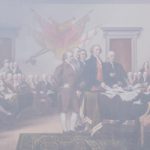
FTZ’ine December 2024
December 2, 2024Time To Vote
In an election this tight, every vote counts.
Make sure yours is one of them.
Last minute campaigning is consuming all the oxygen in Washington. Congress was able to pass a temporary spending bill to kick off the new government fiscal year that started at the beginning of this month. Yes, that means MPF caps have increased. For ports that use the bid and rotation program, the new fiscal year could also mean that you have or will have a new U.S. Customs Officer assigned to FTZ duties.
The government is not the only one postponing difficult monetary discussions. After a disruptive but thankfully brief strike, the ILA agreed to return to work at east and gulf coast ports until mid-January. That means there is the possibility of both a government and east/gulf port shutdown right after the new year. And who knows how the next President will play into those conversations.
Scary.
Top Story: Candidates Talk Trade Down The Stretch
Trade has taken a place of honor at rallies for both Presidential candidates.
In swing state Pennsylvania, former President Donald J. Trump said “tariff is the most beautiful word in the dictionary. More beautiful than love, more beautiful than respect.”
The FTZine staff isn’t sure about that. But the former President has offered tariffs as the solution to tax cut funding, paying for childcare, and filling other budget gaps.
Vice President Harris on the other hand has firmly criticized Trump’s tariff approach, arguing it would act as a $3,900 sales tax on Americans and cause price hikes and inflation. Rather than adopt a broad-brush tariff policy, she aims to calibrate the U.S. response to ensure fair trade, as well as commercial predictability and stability. Despite differing views on solutions, it is clear that trade will play a central role in either administration next year.
Vice President Harris’ policy speeches suggest a focus on reducing reliance on imports through government subsidies rather than import tariffs. The Vice President would continue the use of trade laws to combat violations of international worker rights as well as to enforce environmental standards.
Mr. Trump has threatened to slap steep tariffs on every country, especially China, to raise the cost of foreign products and try to reorder global supply chains towards U.S. sources. New tariffs would hit almost all U.S. imports, more than $3 trillion in merchandise.
His approach could help some companies that are already making their products in the United States, since they would make the cost of entry higher for overseas competitors. But they would simultaneously raise prices for U.S. manufacturers importing components from abroad.
Such a plan would not go unnoticed by our trading partners. In 2018 and 2019, governments around the world responded with tariffs of their own on U.S. products ranging from motorcycles to whiskey. The retaliation was particularly painful for American farmers, prompting the Trump administration to send them a $23 billion lifeline to help offset losses.
In recent months, government officials in Europe, Canada, China and elsewhere have already been drawing up lists of American products they may tax in return.
Vice President Kamala Harris’s campaign has said she plans to use tariffs in a “targeted” fashion. President Biden has maintained tariffs on more than $300 billion of products from China originally installed by the President Trump. It seems likely a Harris administration would maintain those as well.
Manufacturing firms are concerned that raising the cost of foreign parts and materials could hurt their efforts to make products in the United States.
For example, Kent International, a firm based in New Jersey that manufactures bicycles in China as well as in the United States, found itself in an odd situation after Section 301 tariffs on bicycles and bicycle parts from China were introduced in 2018.
Arnold Kamler, the company’s C.E.O., said President Trump’s 2018 tariffs on bicycles and bicycle parts, which were meant to help Americans, put the South Carolina factory at a disadvantage.
The company was able to obtain an exclusion from the tariffs for bicycles that were manufactured in China and imported whole, but it still had to pay a 20 percent to 25 percent tariff on bicycle parts that it brought over from China to be put together in its factory in South Carolina Mr. Kamler said.
Similarly, Kent International’s competitors could import complete bicycles from Taiwan or Vietnam without paying any of the China tariffs. That meant that a policy intended to help American manufacturers was actually putting the factory in South Carolina at a disadvantage. This is a story manufacturing FTZs know all too well. Neither candidate has proposed a solution to this problem, but raising tariff levels would exacerbate the disparity U.S. manufacturers face unless some form of domestic relief is enacted at the same time.
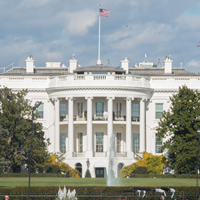

Tech Tip: CBP Highlights Rising Cybersecurity Risks
Anyone who runs a website, or has received a ‘free’ credit lock after their personal information has been stolen knows that cyberattacks are increasing in size and frequency. With global conflict on the rise, U.S. Customs and Border Protection is asking traders to prepare by appointing a cybersecurity point of contact that CBP can use in case of an emergency.
CBP wants the ability to quickly connect with trade partners to resolve disruptions when cyberattacks happen. Customs issued a CSMS urging the addition of a Technical Point of Contact (POC) designated for cybersecurity to each ACE portal top account. CBP would then use the contact whenever a legitimate cybersecurity threat is identified.
To add a cybersecurity POC in your ACE Portal Account:
• Select “Technical Point of Contact” in the “Type” drop down menu field.
• Include “Cybersecurity” in parentheses after the contact’s last name. For example, for a cybersecurity POC named John Doe, the last name field would read “Doe (Cybersecurity).”
Questions related to CBP cybersecurity recommendations? Contact us at info@iscm.co.
Strikes In Rear View Mirror (But Still Visible)
On October 3rd, the International Longshoremen’s Association (ILA) and the United States Maritime Alliance, Ltd. (USMX) reached a tentative agreement on wages and to extend the Master Contract until January 15, 2025.
At the beginning of the month the union had sent 45,000 members on a three-day strike that shut down container and vehicle handling at 36 East and Gulf Coast ports. Work resumed at most ports along the US East and US Gulf coasts on Friday, October 4th.
The sides still need to return to the bargaining table to negotiate all non-wage issues, including automation which has been a major sticking point to date.
The strike ended when Biden administration officials helped broker the master contract extension. The sides then reached agreement on a 62% pay raise over the six years of a new pact.
In a joint statement announcing the end of the strike, the ILA and USMX announced they will resume discussions on a new master contract in November.
“The International Longshoremen’s Association and the United States Maritime Alliance, Ltd. have reached a tentative agreement on wages and have agreed to extend the Master Contract until January 15, 2025 to return to the bargaining table to negotiate all other outstanding issues,”
North of the border a short work stoppage had shut down both of Canada’s main rail carriers, but the companies reported that operations on their respective networks quickly came back to normal. The rail carriers are optimistic the binding arbitration process would lead to a new labor deal by year’s end or by early 2025.


A $100 Million Settlement
Last week a U.S. judge approved a $102 million settlement with the companies that owned and operated the ship that struck Baltimore's Francis Scott Key Bridge
The mishap by the container vessel Dali killed six people and shut down the Port of Baltimore for months.
The payment resolves the U.S. Justice Department’s civil claim against the two Singaporean companies, Grace Ocean Private Limited and Synergy Marine Private Limited.
The settlement covers money the U.S. government spent responding to the disaster and clearing the wreck of the Dali ship and bridge debris from the Port of Baltimore so the waterway could reopen in June.
A spokesperson for the companies said on Friday they had agreed to pay even though they deny liability.
The companies are fully insured for the settlement costs, and no punitive damages were imposed.
The State of Maryland, which estimates that it will cost $1.7 billion to $1.9 billion to rebuild the bridge by fall 2028, separately filed claims against the companies for the cost of the new bridge, cleanup efforts, environmental claims and other costs.
The shipping companies face additional claims from the families of those killed, workers affected by the port shutdown, Baltimore City and County, insurance companies, a utility and others.
The Dali was leaving Baltimore bound for Sri Lanka when its steering failed because of a power loss. It crashed into one of the bridge’s supporting columns, destroying the vital 1.6-mile span.
USMCA Traders On Edge With Threat Of New 100% Tariff
In a campaign stop in Savannah, Georgia, former President Donald Trump pledged to stop businesses from shipping jobs across the border.
“I want German car companies to become American car companies. I want them to build their plants here,” he declared.
Of course, the FTZ industry is well aware that German car companies already have major assembly plants in South Carolina, Alabama, and Tennessee. They also know that an exodus of production lines flying many flags have built a significant automotive ecosystem in Mexico.
To address this, the former President added that, if elected, he’d put a 100% tariff on every car imported from Mexico and that the only way to avoid those charges would be for an automaker to build the cars in the U.S. That would could cause a huge upheaval in the American auto industry, and send shudders through supply chains that rely on assembly factories south of the border.
BMW has an 8 million-square-foot campus in South Carolina that employs 11,000 people building more than 1,500 SUVs per day for the U.S. and 120 export markets. Mercedes and Volkswagen also have large U.S. factories.
The United States Mexico Canada Agreement (USMCA) is scheduled for a review in 2026. While both Ms. Harris and Mr. Trump are likely to try to change certain aspects of the deal, foreign officials believe a renegotiation under Mr. Trump could be much more contentious and include large tariffs.
The former President also called for lowering the U.S. corporate tax rate from 21% to 15%, but only for companies that produce in the U.S. Harris, the Democratic nominee, wants to raise the corporate tax rate to 28%.
Exporters are concerned about the effect tariff-based revenue replacement would have on U.S. partners. In March of next year, a 50% tariff on American whiskey exports to Europe will snap into effect unless the European Union and the United States can come to an agreement to stop the levies.
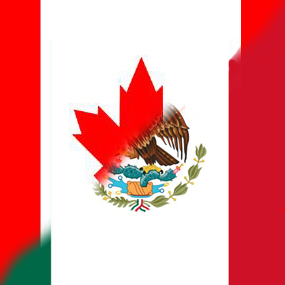
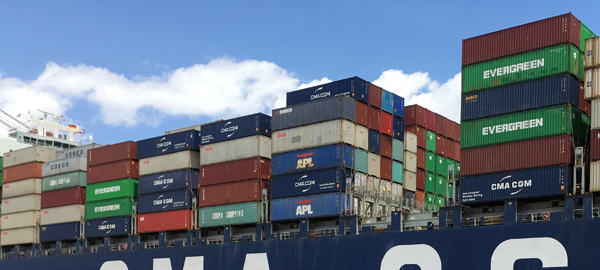
FTZ Staff Activity
- FTZ Board Staff processed a processed a Minor Boundary Modification (S-171-2024) in FTZ 50 on behalf of 360 Global Warehousing and Distribution, LLC, Carson, CA on September 27, 2024
- FTZ Board Staff processed a Traditional Site Framework Subzone Application (S-172-2024) in FTZ 40 on behalf of Permco, Inc., Streetsboro, OH on September 30, 2024
- FTZ Board Staff processed a Traditional Site Framework Subzone Application (S-173-2024) in FTZ 227 on behalf of Canoo, Inc., Pryor, OK on October 1, 2024
- FTZ Board Staff processed a processed a Termination (S-174-2024) in FTZ 176 on behalf of Leading Americas, Inc., Hampshire, IL on October 2, 2024
- FTZ Board Staff processed a processed a Minor Boundary Modification (S-175-2024) in FTZ 281J on behalf of Apollo Export Warehouse, Inc., Opa-Locka, FL on October 4, 2024
- FTZ Board Staff processed a processed a Minor Boundary Modification (S-176-2024) in FTZ 235A on behalf of Renaissance Lakewood, LLC, Lakewood, NJ on October 9, 2024
- FTZ Board Staff processed a processed a Minor Boundary Modification (S-177-2024) in FTZ 84 on behalf of Enstructure Richardson I LLC dba Richardson, Galena Park, TX on October 9, 2024
- FTZ Board Staff processed a processed a Minor Boundary Modification (S-178-2024) in FTZ 57 on behalf of Corsan Logistics, LLC, Huntersville, NC on October 15, 2024
- FTZ Board Staff processed a processed a Minor Boundary Modification (S-179-2024) in FTZ 281 on behalf of Unico Freightways Florida, LLC, Medley, FL on October 15, 2024
- FTZ Board Staff processed a processed a Minor Boundary Modification (S-180-2024) in FTZ 72 on behalf of Cummins, Inc., Whiteland, IN on October 16, 2024
- FTZ Board Staff processed a processed a Minor Boundary Modification (S-181-2024) in FTZ 22 on behalf of ShipNetwork, McCook, IL on October 21, 2024
- FTZ Board Staff processed a processed a Minor Boundary Modification (S-182-2024) in FTZ 171 on behalf of Bennett Motor Express LLC, Dayton, TX on October 21, 2024
- FTZ Board Staff processed a processed a Minor Boundary Modification (S-183-2024) in FTZ 29Z on behalf of Sazerac Company, Inc., Owensboro, KY on October 22, 2024
- FTZ Board Staff processed a processed a Termination (S-184-2024) in FTZ 35 on behalf of Pace Analytical Life Sciences, LLC, Norristown, PA on October 22, 2024
- FTZ Board Staff processed a processed a Minor Boundary Modification (S-185-2024) in FTZ 262 on behalf of Avaya, LLC, Olive Branch, MS on October 23, 2024
- FTZ Board Staff processed a processed a Minor Boundary Modification (S-186-2024) in FTZ 129E on behalf of Port of Bellingham, Bellingham, WA on October 23, 2024
Foreign-Trade Zone Board Activity
-
- Kawasaki Motors Manufacturing Corp., U.S.A. submitted a notification of proposed production activity for additional components of all-terrain vehicles within Foreign-Trade Zone 59A in Lincoln, Nebraska. MORE
- SNRA Commodities, Inc. received authorization of production activity for pecans within Foreign-Trade Zone 68 in Fabens, Texas. MORE
- AbbVie, Inc. received authorization of production activity for additional components of pharmaceutical products within Foreign-Trade Zone 22S in North Chicago, Illinois. MORE
- Permco, Inc. submitted an application to operate its facilities in Montville and Streetsboro, Ohio as a subzone of Foreign-Trade Zone 40. MORE
- Canoo Inc. submitted an application to operate its facilities in Pryor, Oklahoma as a subzone of Foreign-Trade Zone 227. MORE
- World Trade Center Utah received reissuance of the Grant of Authority for Foreign-Trade Zone 30 in Salt Lake City, Utah. MORE
- Renaissance Lakewood, LLC submitted a notification of proposed production activity for prescription nasal spray products within Foreign-Trade Zone 235 in Lakewood, New Jersey. MORE
- Catalent Pharma Solutions, LLC received authorization of production activity for nonsteroidal antiandrogen tablets within Foreign-Trade Zone 29Y in Winchester, Kentucky. MORE
- Intel Corporation received approval to expand Foreign-Trade Zone 75C by adding an additional site in Phoenix, Arizona. MORE
- Patheon Softgels received authorization of production activity for additional components of pharmaceutical products within Foreign-Trade Zone 230C in High Point, North Carolina. MORE
- RECARO Aircraft Seating Americas, LLC submitted a notification of proposed production activity for aircraft seats within Foreign-Trade Zone 196 in Fort Worth, Texas. MORE
- Robert Bosch Semiconductor LLC submitted a notification of proposed production activity for silicon carbide wafers within Foreign-Trade Zone 143 in Roseville, California. MORE
- Phillips 66 Company submitted a correction to its application for production activity for renewable fuels and by-products within Foreign-Trade Zone 3 in San Francisco, California. MORE
- The City of Phoenix received approval to expand the activation limit of ASF Foreign-Trade Zone 75 in Phoenix, Arizona to 3,000 acres. MORE
- The Port of Houston Authority received approval to expand the activation limit of ASF Foreign-Trade Zone 84 in Phoenix, Arizona to 3,000 acres. MORE
- Boss Laser, LLC submitted a notification of proposed production activity for laser machines within Foreign-Trade Zone 250 in Sanford, Florida. MORE
- Lucid Motors USA, Inc. received authorization of production activity for additional components of lithium ion batteries within Foreign-Trade Zone 75N in Casa Grande and Tempe, Arizona. MORE
- Gotion Inc. received authorization of production activity for lithium battery packs and lithium battery systems within Foreign-Trade Zone 22AF in Manteno, Illinois. MORE
- Catalent Pharma Solutions, LLC received approval to operate its Winchester, Kentucky facilities as Subzone Y of Foreign-Trade Zone 29. MORE
- Merck, Sharp & Dohme LLC submitted a notification of proposed production activity for pharmaceutical products for research and development within Foreign-Trade Zone 49Y in Rahway, New Jersey. MORE
- J.J.C. International Distributors LLC dba Clar Company received authorization of production activity for galvanized steel products within Foreign-Trade Zone 32 in Miami, Florida. MORE
- Senior Operation LLC received authorization of production activity for expansion joints and clamshell bellows within Foreign-Trade Zone 80 in New Braunfels, Texas. MORE
- Kawasaki Motors Manufacturing Corp., U.S.A. submitted a notification of proposed production activity for electric personal transportation vehicles within Foreign-Trade Zone 59A in Lincoln, Nebraska. MORE
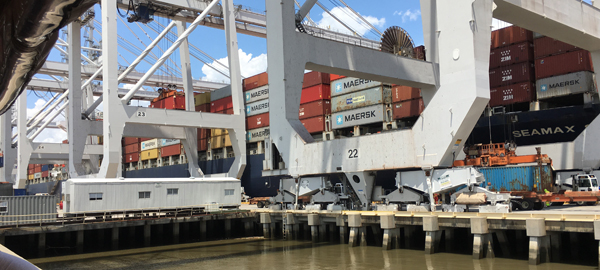
Time To Vote:
In an election this tight, every vote counts.
Make sure yours is one of them.
Last minute campaigning is consuming all the oxygen in Washington. Congress was able to pass a temporary spending bill to kick off the new government fiscal year that started at the beginning of this month. Yes, that means MPF caps have increased. For ports that use the bid and rotation program, the new fiscal year could also mean that you have or will have a new U.S. Customs Officer assigned to FTZ duties.
The government is not the only one postponing difficult monetary discussions. After a disruptive but thankfully brief strike, the ILA agreed to return to work at east and gulf coast ports until mid-January. That means there is the possibility of both a government and east/gulf port shutdown right after the new year. And who knows how the next President will play into those conversations.
Scary.

